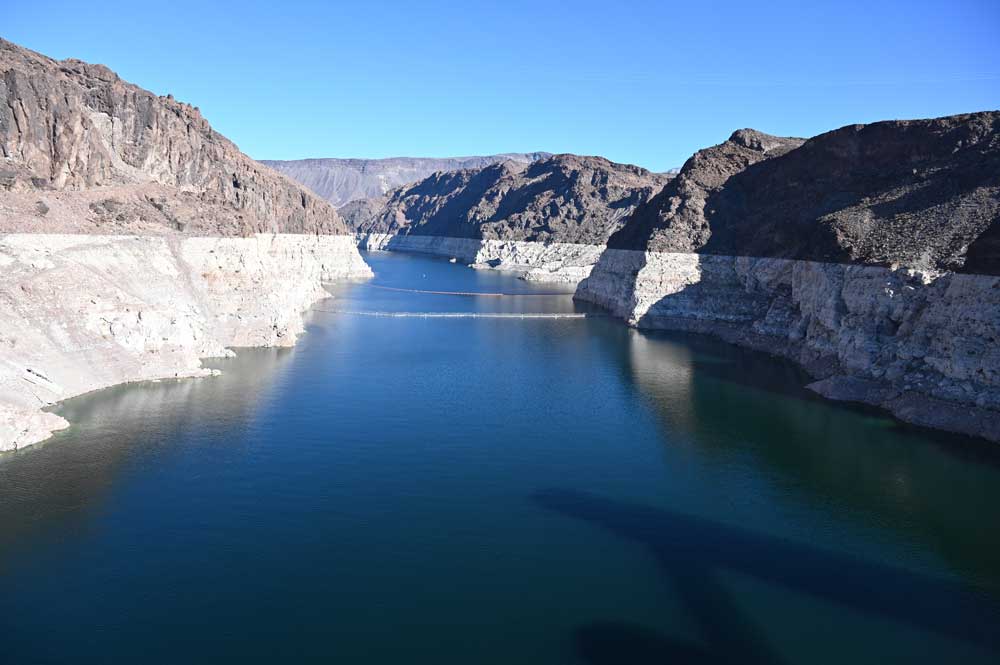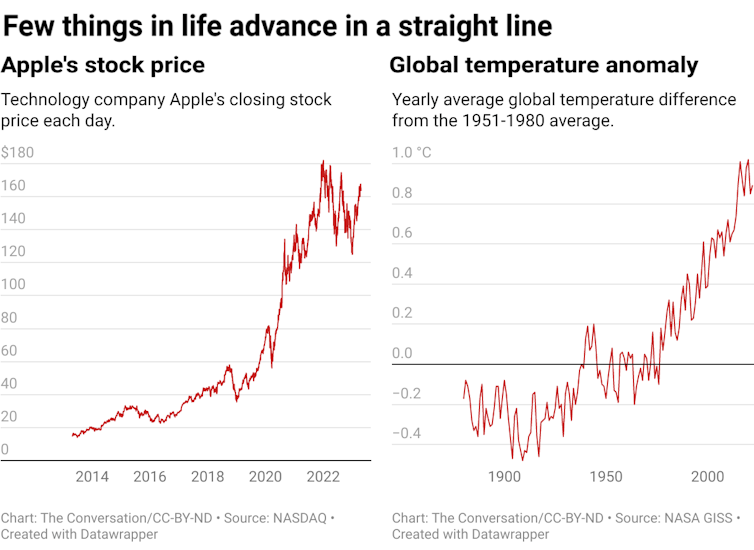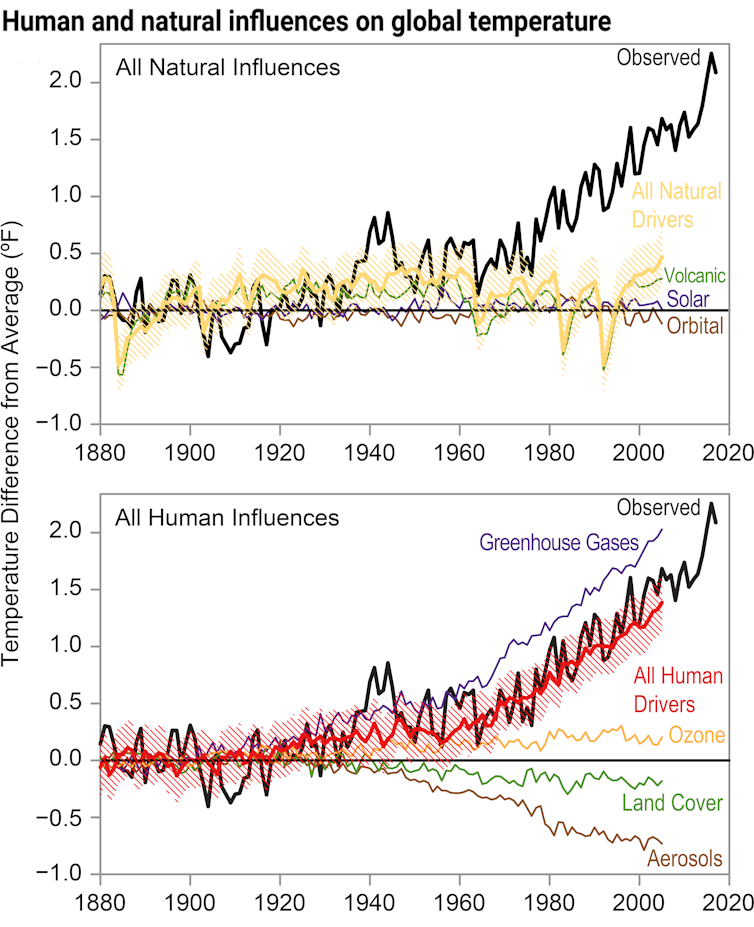
By Jeremy P. Shapiro
Cold spells often bring climate change deniers out in force on social media, with hashtags like #ClimateHoax and #ClimateScam. Former President Donald Trump often chimes in, repeatedly claiming that each cold snap disproves the existence of global warming.
From a scientific standpoint, these claims of disproof are absurd. Fluctuations in the weather don’t refute clear long-term trends in the climate.
Yet many people believe these claims, and the political result has been reduced willingness to take action to mitigate climate change.
Why are so many people susceptible to this type of disinformation? My field, psychology, can help explain – and help people avoid being misled.
The allure of black-and-white thinking
Close examination of the arguments made by climate change deniers reveals the same mistake made over and over again. That mistake is the cognitive error known as black-and-white thinking, also called dichotomous and all-or-none thinking. As I explain in my book “Finding Goldilocks,” black-and-white thinking is a source of dysfunction in mental health, relationships – and politics.
People are often susceptible to it because in many areas of life, dichotomous thinking does something helpful: It simplifies the world.
Binaries are easy to handle because there are only two possibilities to consider. When people face a spectrum of possibilities and nuance, they have to exert more mental effort. But when that spectrum is polarized into pairs of opposites, choices are clear and dramatic.

eyetoeyePIX via Getty Images
This mental labor-saving device is practical in many everyday situations, but it is a poor tool for understanding complicated realities – and the climate is complicated.
Sometimes, people divide the spectrum in asymmetric ways, with one side much larger than the other. For example, perfectionists often categorize their work as either perfect or unsatisfactory, so even good and very good outcomes are lumped together with poor ones in the unsatisfactory category. In dichotomous thinking like this, a single exception can tip a person’s view to one side. It’s like a pass/fail grading system in which 100% earns a pass and everything else gets an F.
With a grading system like this, it’s not surprising that opponents of climate action have found ways to reject global warming research, despite the overwhelming evidence.
Here’s how they do it:
The all-or-nothing problem
Climate change deniers simplify the spectrum of possible scientific consensus into two categories: 100% agreement or no consensus at all. If it’s not one, it’s the other.
A 2021 review of thousands of climate science papers and conference proceedings concluded that over 99% of studies have found that burning fossil fuels warms the planet. That’s not good enough for some skeptics. If they find one contrarian scientist somewhere, they categorize the idea of human-caused global warming as controversial and conclude that there is no basis for action.
Powerful economic interests are at work here: The fossil fuel industry has funded disinformation campaigns for years to create this kind of doubt about climate change, despite knowing that their products cause it and the consequences. Members of Congress have used that disinformation to block or weaken federal policies that could slow climate change.
Expecting a straight line in a variable world
In another example of black-and-white thinking, deniers argue that if global temperatures are not increasing at a perfectly consistent rate, there is no such thing as global warming.
However, complex variables never change in a uniform way; they wiggle up and down in the short term even when exhibiting long-term trends. Most business data, such as revenues, profits and stock prices, do this too, with short-term fluctuations contained in long-term trends.

CC BY-ND
Mistaking a cold snap for disproof of climate change is like mistaking a bad month for Apple stock for proof that Apple isn’t a good long-term investment. This error results from homing in on a tiny slice of the graph and ignoring the rest.
Failing to examine the gray area
Climate change deniers also mistakenly cite correlations below 100% as evidence against human-caused global warming. They triumphantly point out that sunspots and volcanic eruptions also affect the climate, even though evidence shows both have very little influence on long-term temperature rise in comparison to greenhouse gas emissions.
In essence, deniers argue that if fossil fuel burning is not all-important, it’s unimportant. They miss the gray area in between: Greenhouse gases are indeed just one factor warming the planet, but they’re the most important one and the factor humans can influence.

4th National Climate Assessment
‘The climate has always been changing’ – but not like this
As increases in global temperatures have become obvious, some climate change skeptics have switched from denying them to reframing them.
Their oft-repeated line, “The climate has always been changing,” typically delivered with an air of patient wisdom, is based on a striking lack of knowledge about the evidence from climate research.
Their reasoning is based on an invalid binary: Either the climate is changing or it’s not, and since it’s always been changing, there is nothing new here and no cause for concern.
However, the current warming is on par with nothing humans have ever seen, and intense warming events in the distant past were planetwide disasters that caused massive extinctions – something we do not want to repeat.
As humanity faces the challenge of global warming, we need to use all our cognitive resources. Recognizing the thinking error at the root of climate change denial could disarm objections to climate research and make science the basis of our efforts to preserve a hospitable environment for our future.
![]()
Jeremy P. Shapiro is Adjunct Assistant Professor of Psychological Sciences at Case Western Reserve University.





























Ben Hogarth says
The “Thinking Error” implies there was any thought on climate change deniers in the first place. News flash – they don’t do a whole lot of that.
What they DO “do” is repeat rhetorical talking points (propaganda) that they’ve been fed for years while (ironically) accusing scientists and educated persons of being “brainwashed” by the ivory towers. Now they’ve started calling this “ScienceTM” apparently to push back against overwhelming scientific community resolve. Now fairly hard science is being attacked as an institution rather than a process.
But here is the inherent irony in all the counter arguments to the climate change reality – they’re almost entirely based in the wrong “science,” no matter the argument. For example, rising sea surface temperature averages are often attributed by climate deniers as being part of “other” natural processes that aren’t human induced (anthropogenic). But critics rarely go beyond absurd and wild speculation, let alone support their counter claims with facts and evidence. If they were actually intelligent, they’d know there are three primary scientific areas that affect the earths overall climate. You have astrological (sun, moon, gravitational, etc.); atmospheric (pressure / thermodynamics of ocean and air); and then geothermic (originating from the earth itself such as heat vented via conduction).
You can’t be an intelligent critic and attribute well known scientifically evidenced atmospheric variables to either astrology or geology. Although the sciences to interact at specific points, the nature of the critics claims is entirely unfounded and unscientific. Sea surface temperatures changing as a result of either the sun via radiation or the earth venting heat via conduction have been DISPROVEN.
And if there is anything I can tell you about actual science, it’s not rhetorical and it’s not based in the act of proving – it’s based in the act of disproving and arriving at truth by deduction.
And when fact and truth are what you are deducting, all you have are the deniers.
Deirdre says
I appreciate the psychology behind it, but unless someone they worship says we have climate change, we don’t. It wouldn’t matter what the research shows, it won’t matter what the weather is like. The all or nothing thinking applies to a lot more than climate change, it’s a way of life.
Hopefully enough people do believe in the facts to facilitate changes that may help this desperate situation. Sorry to be negative, but I doubt we do.
Even people that believe the facts don’t want to take the bus to work if they can drive, for example. How many Americans would give up air conditioning? Pay more for gas? Find alternatives for fossil fuels if they cost more or are less convenient?
It’s easier to live in ignorance than to make sacrifices for most people.
It’s hard to get everyone to even recycle what they can, even though it couldn’t be more convenient when they take the buckets from your driveway. Reduce? Reuse? Forget it.
American is clearly one of the richest and most wasteful countries on the planet and few people want to make the lifestyle changes necessary to make for a better future. I don’t either, but it’s necessary, sacrifices need to be made ASAP, or everyone is going to suffer for it. People are suffering for it worldwide already, and this is just the tip of the (melting) iceberg.
DaleL says
The net effect of human activities is to warm the planet. The most constant and steady cause is the increase in atmospheric CO2. The approximate CO2 level for the past many millions of years has been calculated by various methods. The estimates are of necessity not precise, but during the Eocene thermal maximum (55 million years ago), CO2 atmospheric levels were about 1400 ppm. That is about 3 times the level as today. The Earth was so warm that alligators lived in what is today Alaska. Alaska then had a climate similar to South Carolina today. By the end of the Eocene (45 million years ago), CO2 levels had fallen to about 800 ppm. The Earth was still so warm that there were no permanent polar ice caps.
As heat is added to the Earth, it does not result in a uniform heating in all locations. Rather the added heat drives atmospheric patterns such as rain and wind (weather) and the circulation in the oceans. It can paradoxically cause some locations to cool, even as the planet on average becomes warmer. Think of a propane powered refrigerator as an example of heat being used to cool. https://www.warehouseappliance.com/blog/functions-of-a-propane-refrigerator/
It is also important to remember that the Earth has a lot of inertia. A massive block of ice such as that covering Antarctica will take a millennia to melt. However, as it is melting, the climate, sea rise, volcanic activity will all be affected in ways that are difficult to predict.
Bill C says
Why doesn’t scientific fact change the minds of climate change deniers? Because for most of them it is not a question of science at all, but of Faith. God made the world therefore the world is perfect and there is nothing mere humans can do that can affect God’s perfect creation.
don miller says
that is close. the bible says God created and will keep it around until when he destroys it. it won’t be gradual but be sudden. google it. what does the bible say about the destruction of the earth.
Geezer says
To think that you can vote is scarier than the specter of nuclear war.
There’s no shame in going back to elementary school—you can meet
classmates there that can mentor you.
Today’s free factoids:
– Moby Dick is not a social disease.
– Grape Nuts are not a urological diagnosis.
– Mothballs are not collected with really tiny tweezers from moths.
Pogo says
@Geezer
Well said.
If everyone in Florida who is actually eligible to vote would get off their ass, register, and vote — the Republican Party would be knocked on its ass.
Election day is tomorrow, every fucking day, for the pricks with their foot on our necks. All this shit happening in Florida for the past 25 years is the fault of the dogs that didn’t bark. Period.
One tycoon, like the shithead that just ponied up over a billion dollars for the goddamn Federalist Society, could change the history of the human race by putting that much weight behind the side of the rest of us.
Sherry says
Ahhhhh Wonderful Geezer! Loving your comments here again! You are so incredibly clever!
Voice of Reason says
The problem I have with climate change is the agenda and the control behind it. I am all for protecting the earth and being a good steward of God’s wonderful creation. I try to live with a minimal footprint, I compost and I pick up others trash when I am on the beach. Do 8 billion people have an impact on the earth? Yes! The problem I have is the agenda and lack of common sense approach to all of this. The name changed from global warming to climate change because the scientific projections were wrong. No one can project the future and the current projections will most likely be wrong. If you are a scientist who presents data questioning the CO2 narrative or anything that goes against the climate cult, you will be blacklisted and denied funding. Even if we knew the exact amount of CO2 impact, what could we actually do to change things? You could spend $20 trillion dollars and not change anything except making a few elites richer. There is no free thinking when it comes to real solutions, just taxes and regulations and picking/subsidizing what the powers at be want. The solutions that are presented are more big government control. For example, some states want to ban gas lawn mowers or leaf blowers or gas stoves or diesel trucks in the future. We are told that driving a Tesla will save the planet, but we ignore where the electricity actually comes from (diesel generator or coal plant or nuclear?) or the slave labor and land destruction in mining the minerals needed for the Tesla or what happens when the batteries are no good and go to the landfill. We are now seeing how inferior and destructive wind turbines are turning out to be in addition to affecting sea life and killing birds. Nothing is recycled anymore since China no longer buys it from us. We need a better incineration process for trash like Japan has. I want to see this world cleaned up, but please present real practical solutions. People are tired of the hypocrites like Davos elites flying in on private jets to discuss climate change.
We need to offer real solutions – how about trash bags made out of bamboo or hemp that break down quicker? How about we stop making so many products out of petroleum plastics that do not break down or improving our wastewater treatment worldwide? Instead of banning things or shaming “climate deniers”, we need to offer better solutions that will actually make a difference and really look at the true life cost from cradle to grave (EVs often ignore this and would not survive if not subsidized).
DaleL says
A Gish Gallop of pseudo arguments. However, here are answers to some of them:
The name changed from Global Warming to Climate Change because some people could not understand how a warming planet could result in paradoxical cooling in a few locations. It was for PR purposes.
The consensus projections as to climate change have not been proven wrong. Part of the issue is because the media, especially Fox, hype the extreme predictions and ignore the realistic consensus.
Scientists who present peer reviewed studies are not denied funding or blacklisted. “Scientists” who present questionable claims based on bogus data are ignored and called to task for their hypocrisy. Transparency and peer review are the standard by which studies are measured, not outrageous claims hyped on the “news”.
Electricity can be generated by many means. Wind energy and solar energy are essentially free, except for maintenance, once in place. Nuclear is far less damaging than coal or oil.
A 2009 study using US and European data on bird deaths estimated the number of birds killed per unit of power generated by wind, fossil fuel and nuclear power systems. The author estimated that in 2006: wind farms killed approximately seven thousand birds in the United States, nuclear plants about 327,000 and fossil-fueled power plants 14.5 million. Go figure, the mining of coal, transportation of coal, and the pollution from coal kills birds!
A Gish gallop is a type of logical fallacy – meaning an error in reasoning – that occurs when someone throws at you a myriad of half-truths and misleading statements in hopes of making their stance stronger. https://fallacyinlogic.com/gish-gallop/
Voice of Reason says
My main point is that instead of working towards a common sense and common solution to better the environment, it is a heavy handed top down government control approach that picks the winners and losers and controls or taxes its citizens into compliance. Our electrical grid at the moment cannot handle an influx of electric cars and when you honestly look at cradle to grave, we are simply trading one environmentally impactful source of energy (fossil fuels) for another one (electric cars) that isn’t much better (strip mining to get precious minerals that are often obtained through slave labor and then having to use another energy source to generate electricity to charge the batteries and then the issue of disposing of the batteries). My point is that we need all options on the table and new energy sources and we can do better than we are doing and what we are currently doing at the moment is having little to no improvement on the environment, especially when you factor in countries like China or India who don’t give a rip about the environment. My question for you: if you had $20 trillion to fix the climate change problem, what would you do and would it change anything? I think we need these honest discussions but the mainstream media and politics has made us so polarized and prevented us from working together.
DaleL says
Do you actually have any facts to back up your multiple half-truths and misleading statements?
EVs are projected to grow in sales, but so is our electricity production. Energy is energy. The transition is not going to be overnight. The average vehicle in the USA lasts over a decade. The typical EV gets an adjusted equivalent of a 100 mpg. Overall energy use will drop as more EVs are on the roads.
Slave labor? The inflation reduction act requires battery materials to be sourced from countries that the USA has free trade agreements. No Slave Labor.
Precious minerals in the lithium ion batteries, yes, and that is why they are so valuable to recycle. Disposal is not an issue as they contain valuable lithium, cobalt, and nickle. (Quit watching Fox!) https://pubs.acs.org/doi/10.1021/acsenergylett.1c02602
My answer: I would tax polluting industries, energy intensive devices and I would provide incentives for clean industries, energy efficient devices. Just as is being done now. As to climate change, it is too late to stop the change, but it is not too late to slow it down.
Sherry says
@VOR. . . along with your “gish-gallop” (I love that term!) slanted point of view, you claiming that “mainstream” media is to blame says it all! If the BS published on FOX daily is not part of the problem, you are completely blind to one side of the equation. Much of what you said is nonsensical. You do know that electric cars are not a source of energy, right?